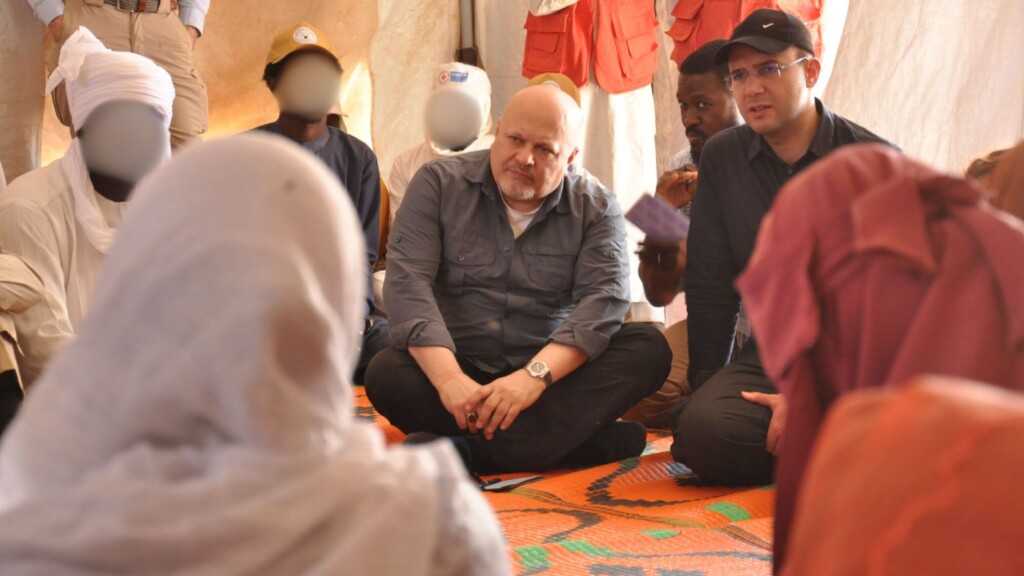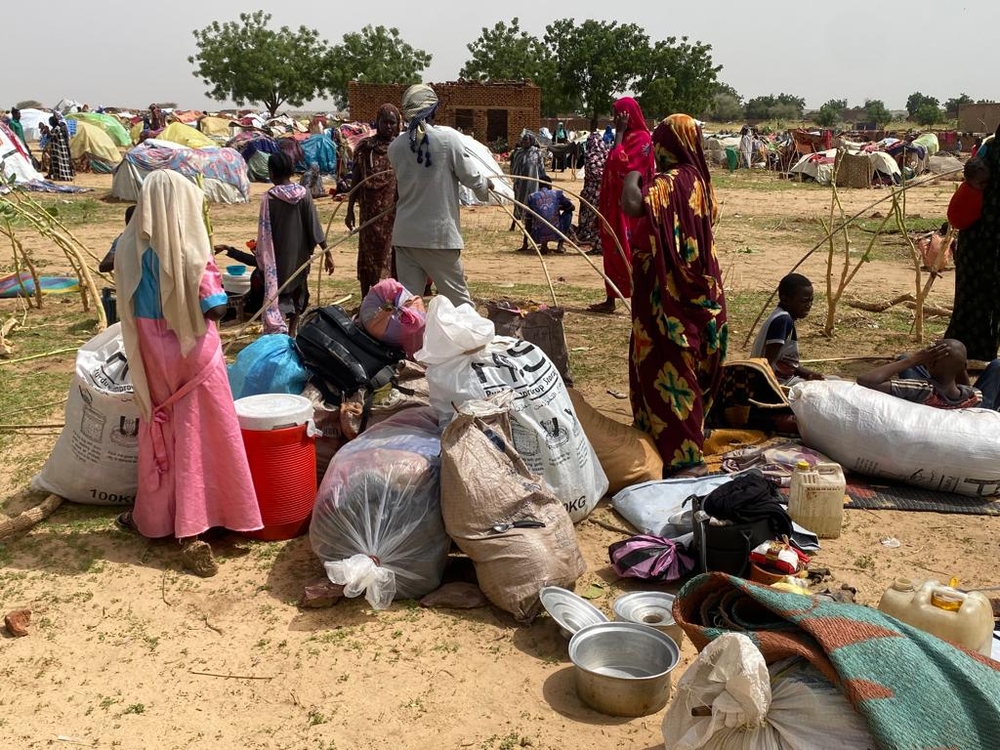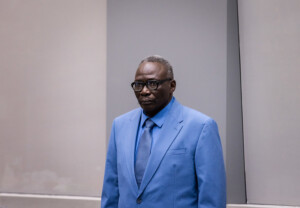ICC Prosecutor: Sudan situation ‘dire by any metric’

ICC prosecutor Karim Khan meets with Darfur refugee leaders in Adré in eastern Chad in end January (File photo: ICC)
“We are fast approaching a breaking point, and the situation in Sudan demands your attention more than ever,” International Criminal Court (ICC) prosecutor Karim Khan said during his briefing to the UN Security Council (UNSC) from N’Djamena, capital of Chad, yesterday.
During his briefing, Khan described the situation in Sudan as “dire by any metric.” One-third of the population in the affected parts of Chad are Sudanese refugees, and they are arriving at a rate faster than Chad and the UN can respond, he said. He said that the Sudan Armed Forces (SAF) and Rapid Support Forces (RSF) are to blame for crimes committed in Darfur.
Khan said that during his visit to the Adré and Farchana refugee camps, he listened to the testimonies of refugees about their suffering and the violations that had occurred, including sexual violence.
During meetings with refugees attended by Radio Dabanga, Khan told Sudanese refugees that the entire world had disappointed Darfur. “Hope must unite us, not despair,” he said, adding that his office was continuing to investigate what happened in Darfur.
Khan called for the support of victims of rape and sexual violence to testify before the team of the Attorney General’s Office, adding: “The one who should feel shame is not the victim but the criminal.”
While addressing the UNSC, Khan quoted a woman who he spoke to who summarised the feelings of many people in Adré and Farchana: “I was displaced many times during the events of 2023… we came here barefoot. We still feel like we are not people. Like we are less than human.”
“We still feel like we are not people. Like we are less than human.”
Sudanese refugee in Chad
People also told Khan that they were targeted for their ethnicity and threatened with extermination. These accusations “constitute Rome Statute violations,” Khan told the UNSC, noting that they are also not in line with the teachings of Islam, “which many of the perpetrators profess to adhere to.”
He stressed figures published by the United Nations Office for Humanitarian Affairs (OCHA) on January 21, estimating the total number of displaced and refugees at 7.6 million since the war broke out in April. 13,100 people have been killed by the conflict according to the Armed Conflict Location and Event Data Project (ACLED) as of January 15 and at least 26,051 injured according to the Sudanese Federal Ministry of Health as of December 8.
Investigations and evidence
Khan said the alleged atrocities in El Geneina, capital of West Darfur, “form a central line” of the ICC’s investigations. “According to intelligence sources, between 10,000 and 15,000 people were killed in El Geneina alone,” said the latest report by the five-member UN Panel of Experts on the situation in Darfur, presented on January 13.
He said they had obtained new evidence for the indictment of former President Omar Al Bashir, former Interior and Defence Minister Abdelrahim Hussein, and former Minister of Interior Affairs and Minister of State for Humanitarian Affairs Ahmed Harun.
Khan noted several reports that Al Bashir, Hussein, and Harun have been released, escaped, or otherwise left Kober prison. He also noted several reports that Al Bashir and Hussein remain at the Aliaa Military Hospital in Omdurman.

According to a formal report presented by the ICC Prosecutor to the UNSC yesterday which spans 19 pages, Harun has fled to eastern Sudan and the Sudanese authorities can communicate with him. This lines up with multiple reports received by Radio Dabanga that he is in Kassala, which is considered one of the former regime’s centres of influence.
He said that the progress of former Darfur Janjaweed leader Ali Kushayb’s trial was “a glimmer of hope for the end of impunity.” Khan predicted that the investigation into Kushayb could end in the first half of 2024.
He stressed that the failure of the international community to implement arrest warrants against wanted persons had fostered a climate of impunity, leading to continued violence.
Chairman of Sudan’s Sovereignty Council and commander-in-chief of the SAF Lt Gen Abdelfattah El Burhan promised to cooperate with the ICC, Khan said, noting that the prosecutor’s office had submitted 35 requests for assistance to which the Sudanese government has not yet responded.
UNSC reactions
Khan’s session provoked many expressions of support for the ICC investigations but also provoked some harsh reactions. A clear international division over the position on the investigations conducted by the ICC into the crimes committed in Darfur during the war was apparent.
Many countries, led by the US, France, Britain, and Japan, expressed their support for the ICC investigations, while China, Russia, Algeria, and Sudan criticised or announced their reservations about the work of the court.
A joint press statement by Switzerland and Japan, on behalf of eight other UNSC members that are State Parties to the ICC Rome Statute, said: “We are deeply concerned by the reports about serious violations of human rights and international humanitarian law and reiterate that international law must be upheld at all times and justice and accountability must be ensured for all violations.”
While Algeria stressed the importance of justice and accountability, explaining that transitional justice must not be separated from stability, Sudanese judicial institutions must be restored, and the Juba Agreement must be upheld.
It called for giving a greater role to the African Union and expressed concern about the deteriorating situation in the country. El Burhan expressed openness to any Algerian role in addressing the Sudanese crisis during a visit to the country on Sunday.
Sudan denied that authorities in Khartoum were not cooperating with the ICC. The country’s representatives said that Sudan has been cooperating with the court since the fall of the Al Bashir regime.
Background
In August this year, ICC Chief Prosecutor Karim Khan paid his first visit to Sudan, following decisions by Sudan’s transitional government to hand Darfur war crimes accused to the court, and to accede to and ratify the 1998 Rome Statute of the International Criminal Court (ICC).
At the end of his visit, Khan announced the establishment of an ICC office with a permanent team in Sudan to further investigate the cases and gather more evidence against the indicted persons. He said he planned to return to Sudan in November and visit Darfur.
The ICC issued arrest warrants against Ahmed Harun and Janjaweed leader Ali Kushayb in 2007.
Kushayb was transferred to the ICC’s custody on June 9, 2020 after surrendering himself voluntarily in the Central African Republic. Upon his arrest, the Sudanese government announced its support for his transfer to the ICC. Kushayb is also charged with a number of crimes by the Sudanese authorities.
In February 2020, Sudanese authorities also agreed that Al Bashir, Harun, and Hussein would be transferred to The Hague to face justice.
Al Bashir was indicted by the ICC in 2009 for war crimes and crimes against humanity in Darfur, and in 2010 for genocide. He was convicted of corruption by a Khartoum court in December 2019 and sentenced to two years in a prison for the elderly. He still faces various other charges in Sudan, including staging a military coup in 1989.
The ICC issued an arrest warrant against Abdelrahim Hussein in 2012 for war crimes and crimes against humanity in Darfur. He and Haroun are also being held in prison in Khartoum.
The ICC issued another arrest warrant in 2014, accusing Abdallah Banda, commander-in-chief of a breakaway faction of the Justice and Equality Movement, of war crimes in Darfur. The former rebel leader is still at large.











 and then
and then